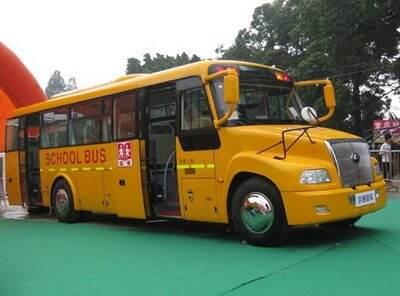
To further safeguard the travel safety of students nationwide, India will introduce a nationwide RFID school bus tracking system. This advanced technology enables real-time monitoring and precise management of school buses, marking India's first adoption of a unified electronic system for tracking school bus movements across the country.
Led by the Bureau of Indian Standards under the Ministry of Consumer Affairs, the system's core innovation lies in its deep integration of multiple technologies. It combines RFID readers, GPS positioning devices, GSM communication modules, and IP-based cameras to automatically record precise boarding and alighting times. This critical data is synchronised in real time via a dedicated digital platform to school administrators and parents, enabling both parties to monitor children's journeys at any moment.
India currently has 248 million pupils enrolled across 1.47 million schools, presenting formidable challenges in ensuring their safe commutes. Countries such as the United States, China and Singapore have extensively deployed similar RFID and GPS school bus tracking systems, achieving significant improvements in pupil transport safety – offering valuable international experience for India to draw upon. Currently, certain private and premium schools in major Indian cities such as Delhi, Mumbai, Bengaluru, and Hyderabad have independently implemented tracking systems based on GSM or GPS technology. The implementation of this national standard will drive the standardisation and harmonisation of such systems across the entire national education sector, thereby further elevating overall safety protection levels.
The core functionality of the RFID school bus tracking system lies in its integration of radio frequency identification technology with data transmission networks, enabling comprehensive visual management of school bus journeys and student boarding/alighting status. The system's foundation comprises RFID tags – compact devices integrated into student ID cards or directly installed on school buses. Each tag carries a unique identification code corresponding to the student's personal details or the bus's dedicated serial number, effectively serving as an electronic identity document.
RFID readers are installed at bus doors, school entrances/exits, and key route checkpoints. When a pupil approaches a door reader with their pass, the device swiftly reads the tag information, automatically recording the pupil's ID, boarding time, and the bus number, thereby completing the boarding check-in. Similarly, when alighting, the pupil swipes their pass to check out, with the reader simultaneously recording the disembarkation time and location. School buses are also equipped with GPS-enabled readers that continuously scan onboard tags to verify student presence whilst en route, whilst simultaneously capturing real-time location data.
This collected identity information, boarding/alighting records, and positioning data is transmitted in real-time via 4G/5G or Wi-Fi networks to a cloud-based management platform. School administrators and parents may access the platform via computer client or mobile application to monitor the school bus's real-time location, travel routes, passenger lists, and boarding/alighting details at any time. Should anomalies occur—such as a student failing to swipe their card upon boarding or alighting, the bus deviating from its pre-set route, or exceeding speed limits—the system will immediately trigger an alert. This notification is delivered via SMS or application push notification to relevant personnel, thereby ensuring student travel safety.
RFID technology further enhances smart campuses across multiple core scenarios including identity management, asset management, and educational services, significantly boosting operational efficiency and convenience. Specific applications include:
Campus Identity Verification and Access Control: RFID tags integrated into student ID cards replace multiple traditional credentials such as access cards and library cards. Students and staff can swiftly access gates, teaching buildings, halls of residence, libraries and other areas by swiping their cards, with the system automatically recording entry/exit times to enable precise access control. For visitors, temporary RFID visitor passes can be issued, restricting permitted zones and validity periods. These can be retrieved or remotely deactivated upon conclusion, enhancing campus security management.
Intelligent Teaching and Attendance: During lessons, teachers automatically record student attendance via RFID readers at classroom entrances. Data synchronises in real-time with teaching management systems, eliminating manual roll calls and saving valuable class time. In practical sessions or training environments, students' equipment collection is tracked via RFID tags. Upon return, the system automatically verifies equipment integrity to prevent loss or damage. simultaneously tracking usage frequency to inform teaching resource allocation.
Campus Asset Management and Traceability: For campus assets such as computers, projectors, laboratory equipment, and books, affixing RFID tags enables rapid inventory and location tracking. Administrators can batch-read asset information using handheld or fixed readers, eliminating item-by-item verification and significantly boosting inventory efficiency. Should assets be moved without authorisation or taken outside designated zones, the system triggers alerts. Simultaneously, tags store usage records, facilitating the tracing of asset movement trajectories and reducing asset loss.
Optimising Campus Life Services: In canteens, students can make payments directly via their RFID student cards, eliminating the need to carry cash or mobile phones. This swift and convenient payment process helps avoid queuing congestion. In dormitory management, beyond access control, RFID tracks late returns or absences, automatically alerting staff. It also links to utility usage data for automated billing and consumption tracking. Additionally, RFID enables automatic vehicle recognition in campus car parks, facilitating swift entry and exit for staff vehicles without manual registration.

Copyright © ©Copyright 2024 Greatest IoT Technology Co., Ltd all rights reserved - Privacy policy